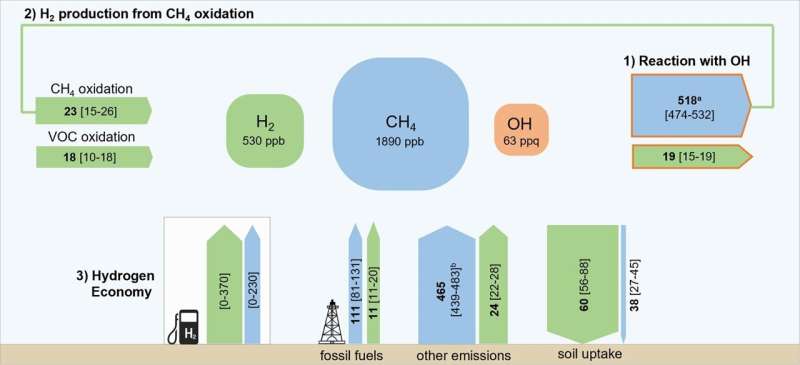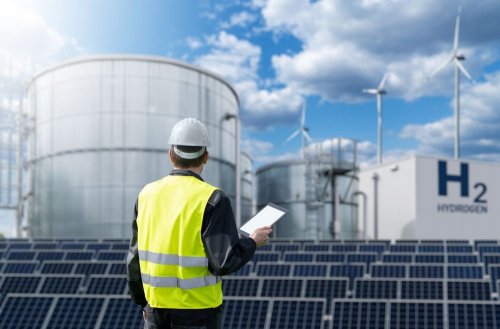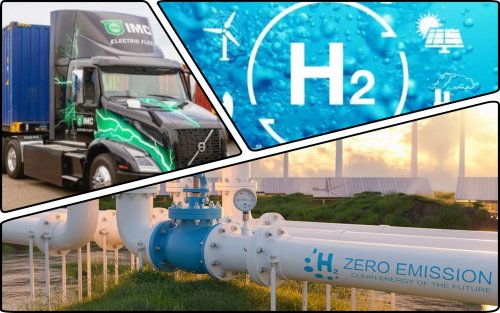Researchers from Princeton University and the National Oceanic and Atmospheric Association have established threshold values for hydrogen emissions that will exacerbate climate change over decades.
In the atmosphere, hydrogen reacts with the hydroxyl radical OH instead of methane, which leads to its accumulation in the atmosphere, reports Phys.org.
As you know, methane is a powerful greenhouse gas that increases climate warming more than 80 times in the first 20 years compared to carbon.
The researchers emphasized that hydrogen is considered as the fuel of the future. However, its sources create many environmental and technological problems that may even exceed the impact of fossil fuels. The necessary solutions are still missing.
They found that the risk of harm increases with hydrogen production methods using methane as a raw material. This highlights the critical need to manage and minimize emissions from hydrogen production.
It is noted that the hydroxyl radical plays a decisive role in the removal of such greenhouse gases as methane and ozone from the atmosphere. A limited amount of this substance enters the atmosphere. The more hydrogen enters the atmosphere, the more methane will accumulate in it. This will increase the heating of the planet.
"If you release some hydrogen into the atmosphere now, it will lead to a progressive accumulation of methane in the years to come," said one of the authors of the study, Matteo Bertagni. "Although hydrogen only lives in the atmosphere for about two years, in 30 years you will still have feedback to methane from this hydrogen."
The researchers found that the critical leakage threshold for green hydrogen reaches 9%. That is, if more than 9% of the produced green hydrogen leaks into the atmosphere – whether at the point of production, during transport, or anywhere along the value chain - the amount of methane in the atmosphere will increase over the next few decades. This would negate some of the climate benefits of moving away from fossil fuels.
The authors of the study emphasized that the emission threshold is even lower for "blue" hydrogen, which is produced by reforming methane with subsequent capture and storage of carbon. After all, methane leaks are created during production. If the level of methane leakage reaches 0.5%, the critical threshold of hydrogen leakage is 4.5%.

The researchers emphasized the importance of the time scale in which the effect of hydrogen on methane in the atmosphere is considered.
According to Bertagna, in the long term (for example, within a century), the transition to a hydrogen economy is likely to bring climate benefits, even if the rate of methane and hydrogen leakage is sufficiently high. Over time, the concentration of the gas in the atmosphere will reach a new equilibrium, and the transition to a hydrogen economy will demonstrate its climate benefits. But before that happens, the potential near-term consequences of hydrogen leaks could lead to irreparable environmental and socio-economic damage.
He emphasized that the transition to hydrogen fuel should take into account the control of hydrogen and methane leaks. The difficulties of the process are due to the fact that hydrogen is a small molecule that is difficult to control and measure. Managing its emissions will likely require researchers to develop better methods to track hydrogen losses in the value chain.
"If companies and governments seriously plan to invest money in the development of hydrogen as a resource, they must make sure that they do it correctly and efficiently," said the scientist.
Earlier, EcoPolitic wrote, that the development of the hydrogen sector will require the minimization of H2 leaks in order to preserve the maximum climate benefits. Although it has no direct effect on the climate, its interaction with other pollutants is about 11 times that of carbon dioxide in the 100-year global warming potential.
As EcoPolitic previously reported, UK government research has shown that over a 100-year time period, a ton of atmospheric hydrogen will heat the Earth about 11 times more than a ton of CO2, with an uncertainty of ± 5.





